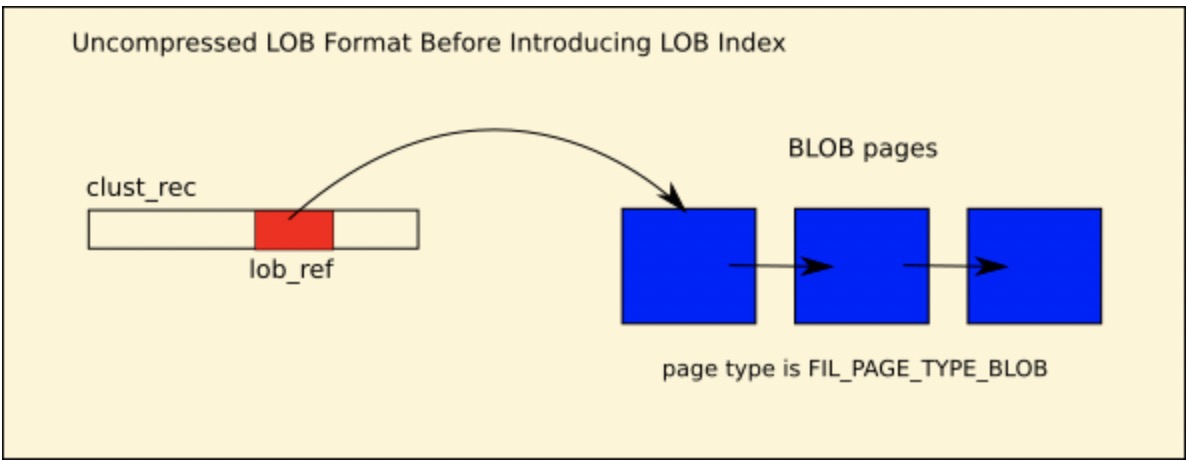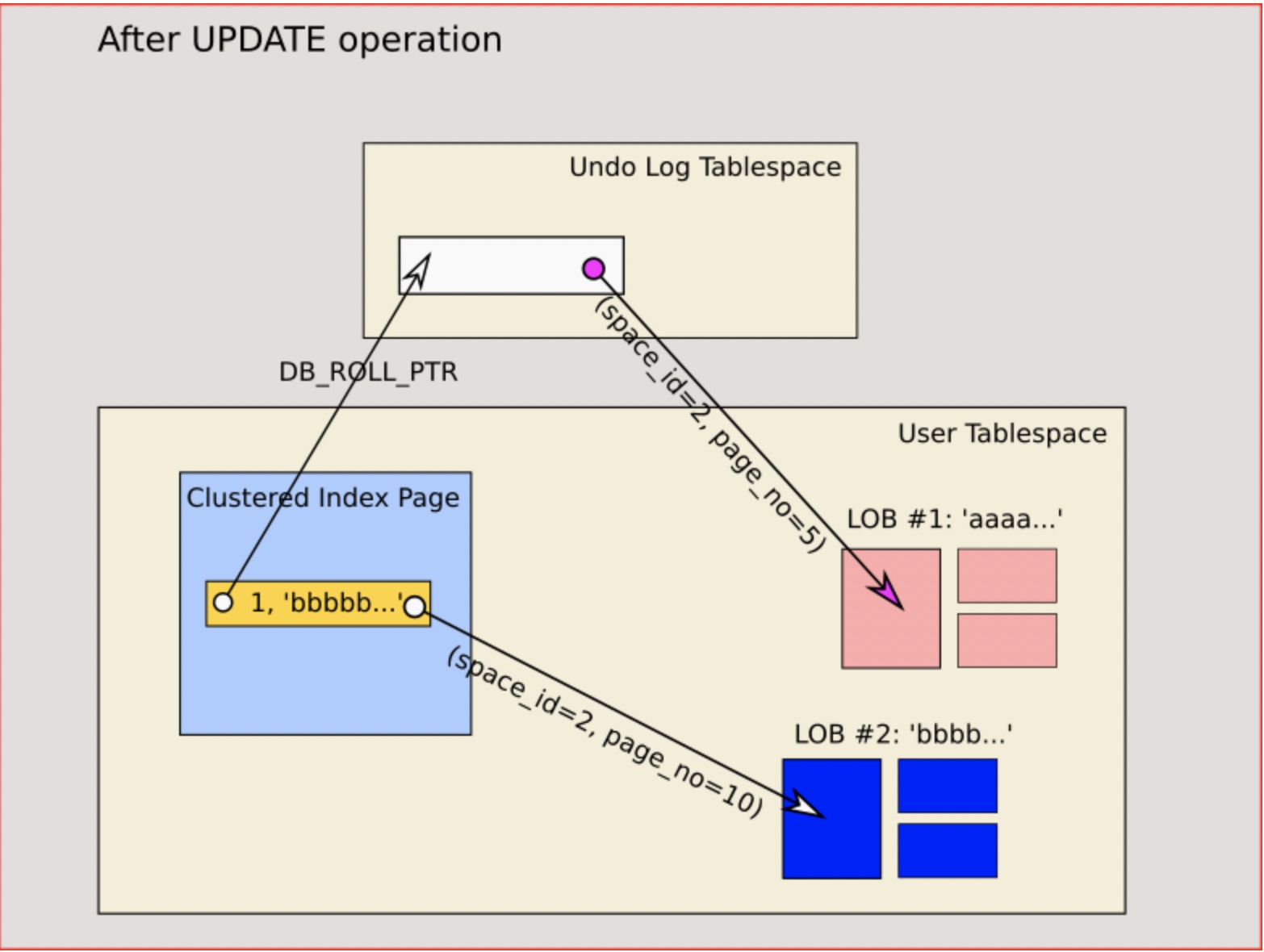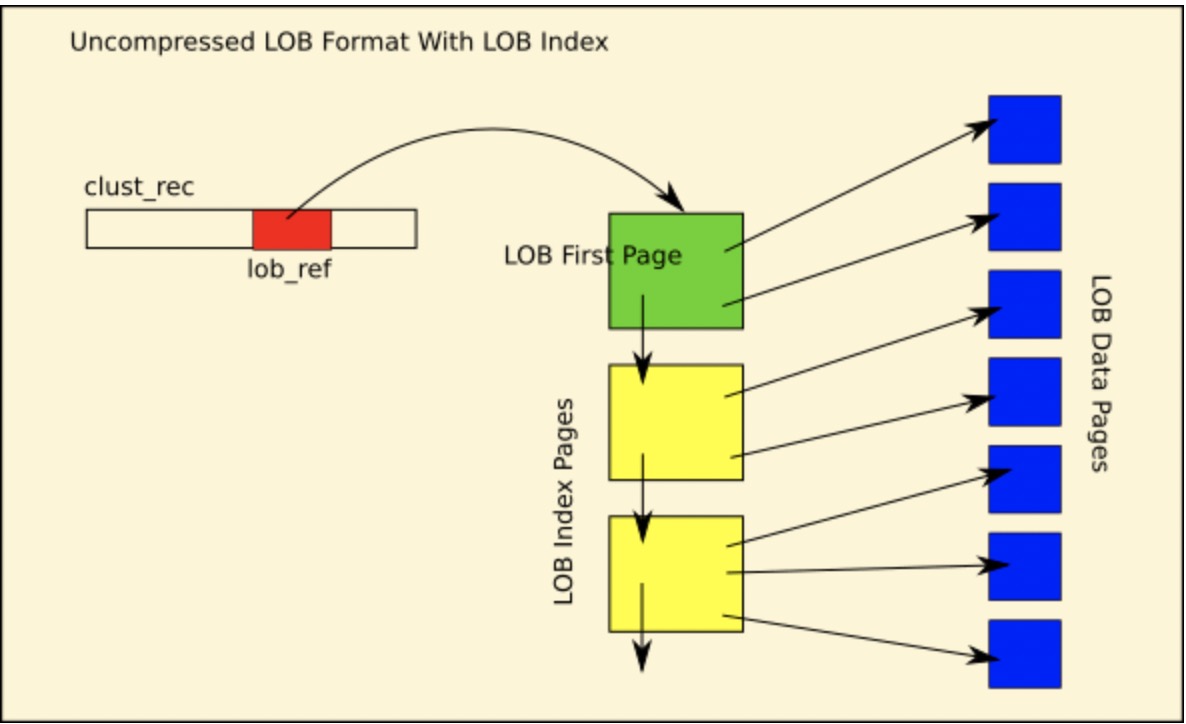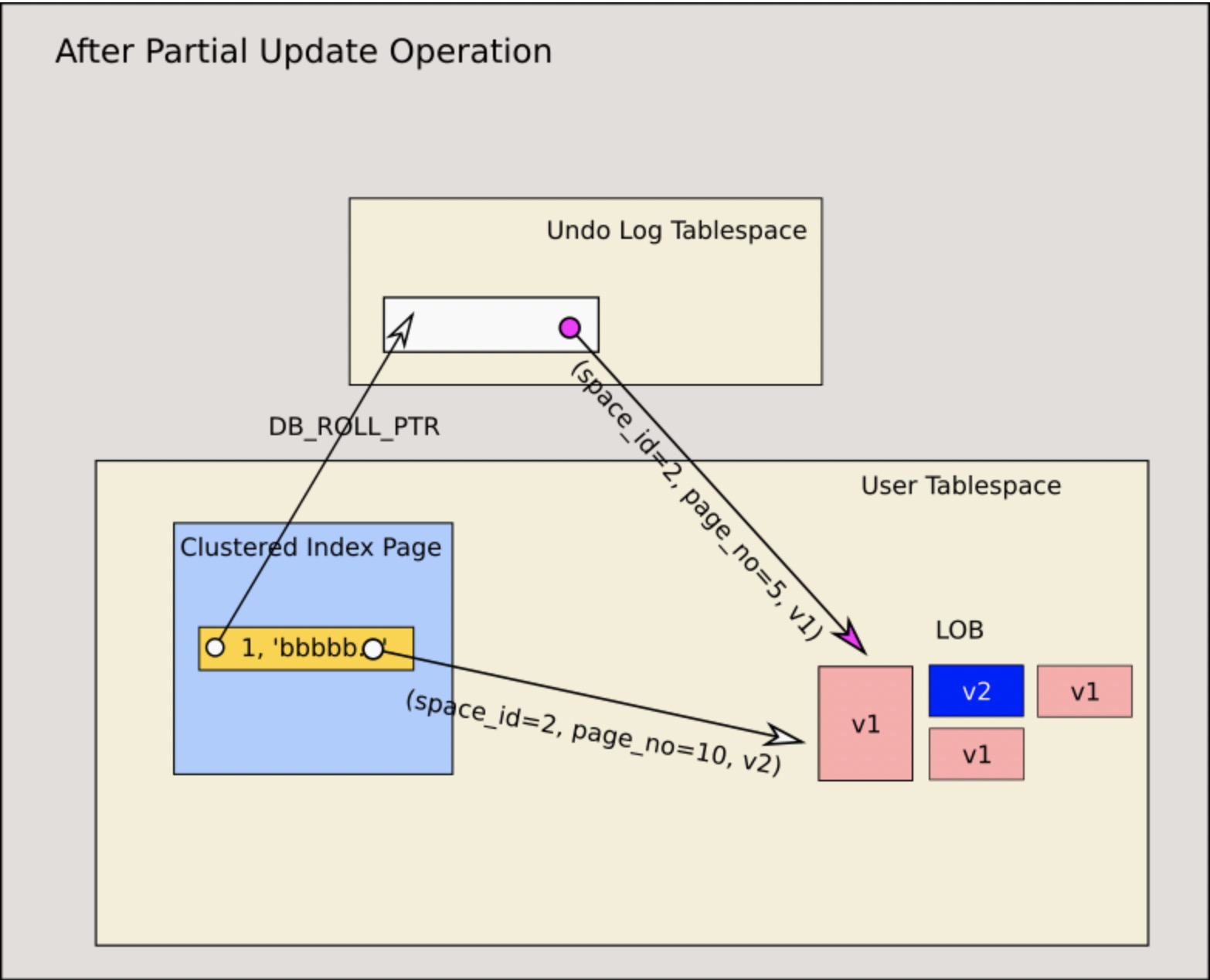MySQL · 源码分析 · innodb-BLOB演进与实现
Author: yunqian
BLOB 介绍
InnoDB 存储引擎中所有可变长度类型的字段(如 VARCHAR、VARBINARY、BLOB 和 TEXT)可以存储在主键记录内,也可以存储在主键记录之外的单独 BLOB 页中(在同一表空间内)。所有这些字段都可以归类为大对象。这些大对象要么是二进制大对象,要么是字符大对象。二进制大对象没有关联的字符集,而字符大对象有。在 InnoDB 存储引擎中,字符大对象和二进制大对象的处理方式没有区别,我们使用“BLOB”来指代上述的大对象字段。BLOB不同大小,不同场景,可以全部存储在主键,部分前缀存储在主键,或者全部存储在外部BLOB页中,本篇文章主要集中在BLOB全部存储在外部BLOB页中时,在innodb中是如何实现的,其他的在主键内部或者前缀在主键内部不再展开说明。只有主键可以在外部存储 BLOB 字段,二级索引不能有外部存储的字段,本文的讨论都是围绕着主键展开。
BLOB 演进
5.6 和 5.7 BLOB
在mysql 5.6和5.7中,innodb实现BLOB的外部存储,实际上将BLOB数据按照页大小切分存储到一批BLOB页中,这些BLOB页从前往后连接成一个链表,在主键上对应字段位置会存储一个指针lob ref(lob ref由 space id,page no,data len等数据构成)指向BLOB页链表的第一个页见,下图:

mysql 5.6 & 5.7 中针对BLOB数据的修改,会创建一个全新的BLOB数据,将主键上lob ref指向新的BLOB数据,undo中对应的lob ref会保存旧的BLOB数据。这样的实现,使得 5.6 和 5.7 中BLOB数据的多版本,完全是由undo来实现,blob只是由lob ref指向定位到数据,可参考下图:

8.0 BLOB
由于mysql 5.6 和5.7中,所有针对blob数据的修改,必须整体替换一个BLOB对象,而BLOB对象占据的空间相对比较大,这样的实现方式一是造成空间的浪费,二是修改效率的降低。针对这些问题,在mysql 8.0中 innodb对BLOB进行了重新设计实现:给BLOB页链表加上索引lob index,这样可以快速定位到BLOB中任何位置,见下图:

在mysql 8.0 中支持了部分更新(partial update),即针对BLOB数据的更新,可以只更新BLOB内的一部分数据(实际上当前只支持特定的json函数)。这个BLOB新的实现解决了mysql 5.6 和 5.7中存在的问题,由于支持partial update,所以BLOB内部就需要维护更新数据的多版本,innodb通过给lob index增加lob versions链表来实现,即lob index不只是连接了前后lob index,串联BLOB页链表,同时lob index维护了对应BLOB页的多版本链表。当对数据进行partial update时,只是对被更新BLOB页增加一个新版本,并将旧版本串联起来,这里面每次partial update都会增加lob version,主键和undo的lob ref指向的都是blob的第一个页 first page,在blob内部基于lob version访问不同版本数据,见下图一次partial update;

5.6 & 5.7 BLOB实现
mysql 5.6 和 5.7 中blob设计实现相对简单,在主键和undo的lob ref指向外部的BLOB页链表数据,我们在此处主要分析下增删改查的关键函数实现。
insert & update
BLOB的 update 操作是创建一个全新的版本,更新主键lob ref到新的BLOB,上版本数据保存在undo的lob ref中;insert操作只是创建一个全新的BLOB数据。BLOB的insert和update操作关键实现函数均是btr_store_big_rec_extern_fields,这个函数实现上就是为每个BLOB数据分配BLOB页,数据写入,将BLOB页串成链表,更新lob ref数据,具体见下面函数注解:
dberr_t btr_store_big_rec_extern_fields(
... ...)
{
... ...
// 遍历big_rec_vec,即遍历所有要插入或者更改的blob
for (i = 0; i < big_rec_vec->n_fields; i++) {
field_ref = btr_rec_get_field_ref(
rec, offsets, big_rec_vec->fields[i].field_no);
extern_len = big_rec_vec->fields[i].len;
prev_page_no = FIL_NULL;
// 对每个blob
for (;;) {
buf_block_t* block;
page_t* page;
mtr_start(&mtr);
if (prev_page_no == FIL_NULL) {
hint_page_no = 1 + rec_page_no;
} else {
hint_page_no = prev_page_no + 1;
}
// 分配page
alloc_another:
block = btr_page_alloc(index, hint_page_no,
FSP_NO_DIR, 0, alloc_mtr, &mtr);
page_no = buf_block_get_page_no(block);
page = buf_block_get_frame(block);
// 将 prev page和刚分配的page 连接起来
if (prev_page_no != FIL_NULL) {
buf_block_t* prev_block;
page_t* prev_page;
prev_block = buf_page_get(space_id, zip_size,
prev_page_no,
RW_X_LATCH, &mtr);
buf_block_dbg_add_level(prev_block,
SYNC_EXTERN_STORAGE);
prev_page = buf_block_get_frame(prev_block);
if (page_zip) {
mlog_write_ulint(
prev_page + FIL_PAGE_NEXT,
page_no, MLOG_4BYTES, &mtr);
memcpy(buf_block_get_page_zip(
prev_block)
->data + FIL_PAGE_NEXT,
prev_page + FIL_PAGE_NEXT, 4);
} else {
mlog_write_ulint(
prev_page + FIL_PAGE_DATA
+ BTR_BLOB_HDR_NEXT_PAGE_NO,
page_no, MLOG_4BYTES, &mtr);
}
} else if (dict_index_is_online_ddl(index)) {
row_log_table_blob_alloc(index, page_no);
}
// 压缩页写入blob page
if (page_zip) {
... ...
} else {
// 非压缩页写入blob page,并和prev page串成链表
mlog_write_ulint(page + FIL_PAGE_TYPE,
FIL_PAGE_TYPE_BLOB,
MLOG_2BYTES, &mtr);
if (extern_len > (UNIV_PAGE_SIZE
- FIL_PAGE_DATA
- BTR_BLOB_HDR_SIZE
- FIL_PAGE_DATA_END)) {
store_len = UNIV_PAGE_SIZE
- FIL_PAGE_DATA
- BTR_BLOB_HDR_SIZE
- FIL_PAGE_DATA_END;
} else {
store_len = extern_len;
}
// 将blob的部分数据写入分配的page中
mlog_write_string(page + FIL_PAGE_DATA
+ BTR_BLOB_HDR_SIZE,
(const byte*)
big_rec_vec->fields[i].data
+ big_rec_vec->fields[i].len
- extern_len,
store_len, &mtr);
mlog_write_ulint(page + FIL_PAGE_DATA
+ BTR_BLOB_HDR_PART_LEN,
store_len, MLOG_4BYTES, &mtr);
mlog_write_ulint(page + FIL_PAGE_DATA
+ BTR_BLOB_HDR_NEXT_PAGE_NO,
FIL_NULL, MLOG_4BYTES, &mtr);
extern_len -= store_len;
if (alloc_mtr == &mtr) {
rec_block = buf_page_get(
space_id, zip_size,
rec_page_no,
RW_X_LATCH, &mtr);
buf_block_dbg_add_level(
rec_block,
SYNC_NO_ORDER_CHECK);
}
// 更新blob ref
mlog_write_ulint(field_ref + BTR_EXTERN_LEN, 0,
MLOG_4BYTES, alloc_mtr);
mlog_write_ulint(field_ref
+ BTR_EXTERN_LEN + 4,
big_rec_vec->fields[i].len
- extern_len,
MLOG_4BYTES, alloc_mtr);
if (prev_page_no == FIL_NULL) {
btr_blob_dbg_add_blob(
rec, big_rec_vec->fields[i]
.field_no, page_no, index,
"store");
mlog_write_ulint(field_ref
+ BTR_EXTERN_SPACE_ID,
space_id, MLOG_4BYTES,
alloc_mtr);
mlog_write_ulint(field_ref
+ BTR_EXTERN_PAGE_NO,
page_no, MLOG_4BYTES,
alloc_mtr);
mlog_write_ulint(field_ref
+ BTR_EXTERN_OFFSET,
FIL_PAGE_DATA,
MLOG_4BYTES,
alloc_mtr);
}
prev_page_no = page_no;
mtr_commit(&mtr);
if (extern_len == 0) {
break;
}
}
}
}
func_exit:
return(error);
}
delete
由于可以外部存储的BLOB数据,只存在主键上,所以删除blob数据,实际是删除主键,这时只是给主键加了一个delete mark标志,没有实际删除,在undo purge流程中将blob数据实际删除。
purge & rollback
由于mysql 5.6 和 5.7 中对blob数据的更新删除都是整体操作,所以update blob或者删除主键,旧数据的删除均是在undo purge中;rollback操作相对 undo purge,删除的是最新的blob数据,两者在blob操作上是一致的,最终均是调用函数btr_free_externally_stored_field来删除blob数据,该函数实现相对比较简单,遍历blob页,逐个删除页,最后更新lob ref为空FIL_NULL。具体见下面函数注解:
void btr_free_externally_stored_field()
{
... ...
// 遍历blob所有的页并释放,
for (;;) {
... ...
page_no = mach_read_from_4(field_ref + BTR_EXTERN_PAGE_NO);
page = buf_block_get_frame(ext_block);
if (ext_zip_size) {
// 压缩页释放blob page
... ...
} else {
// 非压缩页释放blob page
ut_a(!page_zip);
btr_check_blob_fil_page_type(space_id, page_no, page,
FALSE);
// 记录下一个待释放的page no
next_page_no = mach_read_from_4(
page + FIL_PAGE_DATA
+ BTR_BLOB_HDR_NEXT_PAGE_NO);
// 释放当前page
btr_page_free_low(index, ext_block, 0, &mtr);
// 更新blob ref相关数据,page no,extern len
mlog_write_ulint(field_ref + BTR_EXTERN_PAGE_NO,
next_page_no,
MLOG_4BYTES, &mtr);
/* Zero out the BLOB length. If the server
crashes during the execution of this function,
trx_rollback_or_clean_all_recovered() could
dereference the half-deleted BLOB, fetching a
wrong prefix for the BLOB. */
mlog_write_ulint(field_ref + BTR_EXTERN_LEN + 4,
0,
MLOG_4BYTES, &mtr);
}
/* Commit mtr and release the BLOB block to save memory. */
btr_blob_free(ext_block, TRUE, &mtr);
}
}
fetch
blob数据在更新及读取的时候,会作为一个整体读取出来,具体实现函数是btr_copy_blob_prefix, 该函数遍历BLOB页链表,读取所有数据,见下面函数注解:
ulint btr_copy_blob_prefix(
/*=================*/
byte* buf, /*!< out: the externally stored part of
the field, or a prefix of it */
ulint len, /*!< in: length of buf, in bytes */
ulint space_id,/*!< in: space id of the BLOB pages */
ulint page_no,/*!< in: page number of the first BLOB page */
ulint offset) /*!< in: offset on the first BLOB page */
{
ulint copied_len = 0;
// 循环遍历读出blob所有page
for (;;) {
mtr_t mtr;
buf_block_t* block;
const page_t* page;
const byte* blob_header;
ulint part_len;
ulint copy_len;
mtr_start(&mtr);
block = buf_page_get(space_id, 0, page_no, RW_S_LATCH, &mtr);
buf_block_dbg_add_level(block, SYNC_EXTERN_STORAGE);
page = buf_block_get_frame(block);
btr_check_blob_fil_page_type(space_id, page_no, page, TRUE);
blob_header = page + offset;
part_len = btr_blob_get_part_len(blob_header);
copy_len = ut_min(part_len, len - copied_len);
memcpy(buf + copied_len,
blob_header + BTR_BLOB_HDR_SIZE, copy_len);
copied_len += copy_len;
page_no = btr_blob_get_next_page_no(blob_header);
mtr_commit(&mtr);
if (page_no == FIL_NULL || copy_len != part_len) {
UNIV_MEM_ASSERT_RW(buf, copied_len);
return(copied_len);
}
/* On other BLOB pages except the first the BLOB header
always is at the page data start: */
offset = FIL_PAGE_DATA;
ut_ad(copied_len <= len);
}
}
8.0 blob实现
mysql 8.0中 innob对blob的实现相对复杂一点,下面我们针对8.0 blob的多版本、代码及数据结构、及围绕着增删改查等做进一步的实现说明。
多版本
上面我们已经针对mysql 8.0的blob多版本做了一些介绍,这里我们展开说明下,在mysql 8.0中,blob的多版本应该分为三种情况:
- 没有partial update,插入及更新都是全量blob的替换,这种情况blob多版本和5.6 5.7 版本一致,only undo多版本
- 有partial update,则在由undo构建到指定主键版本后,需要基于主键上lob ref的lob version在blob内部构建出合适的version, undo多版本+blob多版本
- 还有一种情况当针对一个blob页更新的数据小于100字节时,此时即使有partial update,也不再使用,而是直接将更改记录到undo中,这种情况在构建出blob版本后,还需要将undo中记录的blob
更改apply到对应版本的blob上,undo多版本+blob多版本+undo small change多版本apply
8.0 update blob导致blob版本发生变化图解
代码文件及数据结构介绍
代码文件
8.0 blob实现代码主要集中在include/ 及lob/目录,具体文件见下面说明:
- lob0del.h lob0del.cc lob::Deleter,在purge时,特定场景清理blob对象
- lob0inf.h 主要是blob insert read update等接口
- lob0ins.h lob0ins.cc Inserter实现blob的insert
- lob0lob.h lob0lob.cc blob实现的入口函数,包括外部使用blob的一些函数及一些结构体和宏定义
- lob0int.h lob0int.cc blob index实现
- lob0first.h lob0first.cc blob first page实现
- lob0undo.h lob0undo.cc 实现blob small change记录在undo上时,使用这些undo构建blob的mvcc版本
- lob0impl.h lob0impl.cc 一些page node定义及一些blob 函数的实现
- lob0util.h lob0util.cc blob page的数据结构及page的分配
- lob0zip.h zlob0* 压缩页的相关blob实现
数据结构
8.0中blob实现主要的数据结构由first_page_t,index_entry_t及data_page_t组成,其中first_page_t表示first page上数据的组织,blob ref指向的page为frist page;index_entry_t为各个blob data page的索引node,存放在first page及特定的index page上,这些index entry串成一个链表,表示一个blob分配成多个page,index entry有助于快速定位blob中间某个位置,为partial update提供条件,另外每个index entry上会有一个version 列表,表示对应blob page的多个版本,实现blob的多版本;data_page_t为存放blob数据的page。各个数据结构的具体数据组织见下面:
/** The first page of an uncompressed LOB. */
struct first_page_t : public basic_page_t {
/** Version information. One byte. */
static const ulint OFFSET_VERSION = FIL_PAGE_DATA;
/** One byte of flag bits. Currently only one bit (the least
significant bit) is used, other 7 bits are available for future use.*/
static const ulint OFFSET_FLAGS = FIL_PAGE_DATA + 1;
/** LOB version. 4 bytes.*/
static const uint32_t OFFSET_LOB_VERSION = OFFSET_FLAGS + 1;
/** The latest transaction that modified this LOB. */
static const ulint OFFSET_LAST_TRX_ID = OFFSET_LOB_VERSION + 4;
/** The latest transaction undo_no that modified this LOB. */
static const ulint OFFSET_LAST_UNDO_NO = OFFSET_LAST_TRX_ID + 6;
/** Length of data stored in this page. 4 bytes. */
static const ulint OFFSET_DATA_LEN = OFFSET_LAST_UNDO_NO + 4;
/** The trx that created the data stored in this page. */
static const ulint OFFSET_TRX_ID = OFFSET_DATA_LEN + 4;
/** The offset where the list base node is located. This is the list
of LOB pages. */
static const ulint OFFSET_INDEX_LIST = OFFSET_TRX_ID + 6;
/** The offset where the list base node is located. This is the list
of free nodes. */
static const ulint OFFSET_INDEX_FREE_NODES =
OFFSET_INDEX_LIST + FLST_BASE_NODE_SIZE;
/** The offset where the contents of the first page begins. */
static const ulint LOB_PAGE_DATA =
OFFSET_INDEX_FREE_NODES + FLST_BASE_NODE_SIZE;
static const ulint LOB_PAGE_TRAILER_LEN = FIL_PAGE_DATA_END;
... ...
}
struct index_entry_t {
/** Index entry offsets within node. */
static const ulint OFFSET_PREV = 0;
static const ulint OFFSET_NEXT = OFFSET_PREV + FIL_ADDR_SIZE;
/** Points to base node of the list of versions. The size of base node is
16 bytes. */
static const ulint OFFSET_VERSIONS = OFFSET_NEXT + FIL_ADDR_SIZE;
/** The creator trx id. */
static const ulint OFFSET_TRXID = OFFSET_VERSIONS + FLST_BASE_NODE_SIZE;
/** The modifier trx id. */
static const ulint OFFSET_TRXID_MODIFIER = OFFSET_TRXID + 6;
static const ulint OFFSET_TRX_UNDO_NO = OFFSET_TRXID_MODIFIER + 6;
/** The undo number of the modifier trx. */
static const ulint OFFSET_TRX_UNDO_NO_MODIFIER = OFFSET_TRX_UNDO_NO + 4;
static const ulint OFFSET_PAGE_NO = OFFSET_TRX_UNDO_NO_MODIFIER + 4;
static const ulint OFFSET_DATA_LEN = OFFSET_PAGE_NO + 4;
/** The LOB version number. */
static const ulint OFFSET_LOB_VERSION = OFFSET_DATA_LEN + 4;
/** Total length of an index node. */
static const ulint SIZE = OFFSET_LOB_VERSION + 4;
... ...
}
struct data_page_t : public basic_page_t {
static const ulint OFFSET_VERSION = FIL_PAGE_DATA;
static const ulint OFFSET_DATA_LEN = OFFSET_VERSION + 1;
static const ulint OFFSET_TRX_ID = OFFSET_DATA_LEN + 4;
static const ulint LOB_PAGE_DATA = OFFSET_TRX_ID + 6;
}
insert & update
mysql 8.0中 blob,insert操作插入一个整体的BLOB数据,update操作可能会插入一个整体的BLOB数据,也可能进行partial update,但无论哪种情形,最终都是由函数btr_store_big_rec_extern_fields实现,,该函数先将rec上所有blob字段的blob ref标记为beging modified,然后逐个blob根据情况进行insert或者partial update,并根据页的压缩与否有两套不同的insert和partial update函数实现,在插入或者更新完毕后,更新blob ref信息。我们下面对btr_store_big_rec_extern_fields、lob::insert和lob::update函数进行注解:
dberr_t btr_store_big_rec_extern_fields(trx_t *trx, btr_pcur_t *pcur,
const upd_t *upd, ulint *offsets,
const big_rec_t *big_rec_vec,
mtr_t *btr_mtr, opcode op) {
... ...
/* Create a blob operation context. */
BtrContext btr_ctx(btr_mtr, pcur, index, rec, offsets, rec_block, op);
InsertContext ctx(btr_ctx, big_rec_vec);
// 设置rec中所有blob字段的blob ref标记为beging modified,在函数返回时,该类析构时去掉该标志
Being_modified bm(btr_ctx, big_rec_vec, pcur, offsets, op, btr_mtr);
// 遍历rec中所有的blob 字段,逐个插入或者更新blob data
for (uint i = 0; i < big_rec_vec->n_fields; i++) {
ulint field_no = big_rec_vec->fields[i].field_no;
byte *field_ref = btr_rec_get_field_ref(index, rec, offsets, field_no);
ref_t blobref(field_ref);
// 判断blob是否有能进行partial update字段,如果是则会尝试进行blob partial update,构建blob多版本,
// 如果否,则完成插入一个全新的blob
bool can_do_partial_update = false;
if (op == lob::OPCODE_UPDATE && upd != nullptr &&
big_rec_vec->fields[i].ext_in_old) {
can_do_partial_update = blobref.is_lob_partially_updatable(index);
}
// 压缩页场景的blob插入及更新,此处不详细展开
if (page_zip != nullptr) {
... ...
} else {
// 普通页类型的blob插入与更新
bool do_insert = true;
if (op == lob::OPCODE_UPDATE && upd != nullptr &&
blobref.is_big(rec_block->page.size) && can_do_partial_update) {
if (upd->is_partially_updated(field_no)) {
/* Do partial update. */
error = lob::update(ctx, trx, index, upd, field_no, blobref);
... ...
} else {
// 标记旧的blob为不能进行partial update,后面会插入一个全新的blob,包括全新的first page
// 此时旧的blob即可以被purge掉了
blobref.mark_not_partially_updatable(trx, btr_mtr, index,
dict_table_page_size(table));
}
}
// 插入一个全新的blob
if (do_insert) {
error = lob::insert(&ctx, trx, blobref, &big_rec_vec->fields[i], i);
... ...
}
}
if (error != DB_SUCCESS) {
break;
}
}
return (error);
... ...
}
blob数据insert根据压缩与否分为insert和z_insert,我们在此主要结合代码分析下非压缩场景,insert函数的实现:insert函数主要是将blob数据按照page切分,存储到多个blob data page中(first page存储开始的一部分data数据),并为每个blob data page建立对应的blob index entry,所有的index entry构成链表
dberr_t insert(InsertContext *ctx, trx_t *trx, ref_t &ref,
big_rec_field_t *field, ulint field_j) {
... ...
// 此处原本意图是当blob长度不是足够大时,blob存储不再使用lobindex,退化使用5.6 blob页列表的方式
// 但ref_t::is_big always 返回true,所以这部分代码实际走不进去,无效代码路径
if (!ref_t::is_big(page_size, len)) {
/* The LOB is not big enough to build LOB index. Insert the LOB without an
LOB index. */
Inserter blob_writer(ctx);
return blob_writer.write_one_small_blob(field_j);
}
// 分配并初始化first page,直接初始化 10个 lobindex entry,及其他信息
first_page_t first(mtr, index);
buf_block_t *first_block = first.alloc(mtr, ctx->is_bulk());
... ...
// 写一部分blob data数据到first page
ulint to_write = first.write(trxid, ptr, len);
total_written += to_write;
ulint remaining = len;
{
/* Insert an index entry in LOB index. */
flst_node_t *node = first.alloc_index_entry(ctx->is_bulk());
// 更新一些信息到first index entry,并且设置blob data page为first page
index_entry_t entry(node, mtr, index);
entry.set_page_no(first.get_page_no());
entry.set_data_len(to_write);
entry.set_lob_version(1);
flst_add_last(index_list, node, mtr);
first.set_trx_id(trxid);
first.set_data_len(to_write);
}
ulint nth_blob_page = 0;
const ulint commit_freq = 4;
// 写余下的blob数据到其他blob page,并为每个blob page建立对应的index entry
while (remaining > 0) {
// 分配data page
data_page_t data_page(mtr, index);
buf_block_t *block = data_page.alloc(mtr, ctx->is_bulk());
if (block == nullptr) {
ret = DB_OUT_OF_FILE_SPACE;
break;
}
// 写数据到blob data page
to_write = data_page.write(ptr, remaining);
total_written += to_write;
data_page.set_trx_id(trxid);
/* Allocate a new index entry */
flst_node_t *node = first.alloc_index_entry(ctx->is_bulk());
if (node == nullptr) {
ret = DB_OUT_OF_FILE_SPACE;
break;
}
// 更新信息到index entry
index_entry_t entry(node, mtr, index);
entry.set_page_no(data_page.get_page_no());
entry.set_data_len(to_write);
... ...
// 添加entry到entry list
entry.push_back(first.index_list());
ut_ad(!entry.get_self().is_equal(entry.get_prev()));
ut_ad(!entry.get_self().is_equal(entry.get_next()));
page_type_t type = fil_page_get_type(block->frame);
ut_a(type == FIL_PAGE_TYPE_LOB_DATA);
// 基于一定频率更新blob ref
if (++nth_blob_page % commit_freq == 0) {
ctx->check_redolog();
ref.set_ref(ctx->get_field_ref(field->field_no));
first.load_x(first_page_id, page_size);
}
}
if (ret == DB_SUCCESS) {
// 更新blob ref
ref.update(space_id, first_page_no, 1, mtr);
ref.set_length(total_written, mtr);
}
return ret;
}
partial update 实现根据页压缩与否分为update和z_update,在此我们主要说非压缩页函数update:
dberr_t update(InsertContext &ctx, trx_t *trx, dict_index_t *index,
const upd_t *upd, ulint field_no, ref_t blobref) {
// 判断此次update是不是small update,改变的字节少于100为small change,small change的更新
// 直接更新blob data,并且undo log记录相应变更,即small change的多版本有undo log来实现,
// 非 small change则需要为对应的page增加新的page版本,即此时blob的多版本由blob的index entry
// 结合多版本blob data page实现
const bool small_change =
(bytes_changed <= ref_t::LOB_SMALL_CHANGE_THRESHOLD);
upd_field_t *uf = upd->get_field_by_field_no(field_no, index);
// 更新信息到first page
first_page_t first_page(mtr, index);
first_page.load_x(first_page_id, page_size);
first_page.set_last_trx_id(trx->id);
first_page.set_last_trx_undo_no(undo_no);
uint32_t lob_version = 0;
// small change不变更blob version,否则增加对应blob version
if (small_change) {
lob_version = first_page.get_lob_version();
} else {
lob_version = first_page.incr_lob_version();
}
for (Binary_diff_vector::const_iterator iter = bdiff_vector->begin();
iter != bdiff_vector->end(); ++iter, ++count) {
const Binary_diff *bdiff = iter;
if (small_change) {
// small change直接更改blob data page的内容
err = replace_inline(ctx, trx, index, blobref, first_page,
bdiff->offset(), bdiff->length(),
(byte *)bdiff->new_data(uf->mysql_field));
} else {
// 非 small change,则需为page增加新的data page,将数据写入新的page,并为新的page
// 分配index entry,将index entry加入entry list的头部
err = replace(ctx, trx, index, blobref, first_page, bdiff->offset(),
bdiff->length(), (byte *)bdiff->new_data(uf->mysql_field),
count);
}
if (err != DB_SUCCESS) {
break;
}
}
blobref.set_offset(lob_version, mtr);
return err;
}
purge & rollback
多版本的purge,最新版本的rollback本质上是一样的,就是在多版本中,去掉一个或者一些版本,只不过purge是最老的一些版本,rollback是最新版本的一个或者一些版本数据,mysql 8.0中blob的purge或者rollback,主要实现函数是lob::purge,该函数根据传入的参数,判断出是rollback还是purge操作,是purge部分blob数据还是整个blob数据,除了一些特殊情况考虑外,整个函数的主要实现就是一个双层while循环,最外一层循环遍历index entry,内层循环遍历index entry的多个版本entry,并基于trx_id和undo_no判断是否可以purge掉,这个判断就决定了是部分数据的purge还是全量数据的purge。下面是lob::purge函数的注解:
// purge函数的一些细节比较多,但多数都有相应的注释,我们这里只说明主要处理逻辑
void purge(DeleteContext *ctx, dict_index_t *index, trx_id_t trxid,
undo_no_t undo_no, ulint rec_type, const upd_field_t *uf,
purge_node_t *purge_node) {
... ...
// 压缩页purge
if (page_type == FIL_PAGE_TYPE_ZLOB_FIRST) {
z_purge(ctx, index, trxid, undo_no, rec_type, purge_node);
return;
}
// rollback blob操作
if (is_rollback) {
rollback(ctx, index, trxid, undo_no, rec_type, uf);
return;
}
... ...
// 双重循环遍历所有index entry,及index entry对应的version 列表,全量blob purge和paritial update purge
// 均是在此处实现,基于vers_entry.can_be_purged结合trx_id和undo_no判断是否可以purge对应blob page
while (!fil_addr_is_null(node_loc)) {
flst_node_t *node = first.addr2ptr_x(node_loc);
cur_entry.reset(node);
flst_base_node_t *vers = cur_entry.get_versions_list();
fil_addr_t ver_loc = flst_get_first(vers, &lob_mtr);
/* Scan the older versions. */
while (!fil_addr_is_null(ver_loc)) {
flst_node_t *ver_node = first.addr2ptr_x(ver_loc);
index_entry_t vers_entry(ver_node, &lob_mtr, index);
if (vers_entry.can_be_purged(trxid, undo_no)) {
ver_loc = vers_entry.purge_version(index, vers, free_list);
} else {
ver_loc = vers_entry.get_next();
}
}
node_loc = cur_entry.get_next();
cur_entry.reset(nullptr);
/* Ensure that the parent mtr (btr_mtr) and the child mtr (lob_mtr)
do not make conflicting modifications. */
ut_ad(!lob_mtr.conflicts_with(mtr));
mtr_commit(&lob_mtr);
mtr_start(&lob_mtr);
lob_mtr.set_log_mode(log_mode);
first.load_x(page_id, page_size);
}
// purge完后更新blob ref
ref.set_page_no(FIL_NULL, mtr);
ref.set_length(0, mtr);
}
fetch
读取及update操作都要对blob数据进行读取,由上面我们知,mysql 8.0的blob多版本是分三种情况的,第一和第二种情况,blob数据的读取,具体实现均是由函数lob::read实现(lob::z_read读取压缩页不再详细说明)。第三种情况是结合lob::read函数读取出来的blob数据,apply undo_vers_t中的small change数据构建出需要的blob版本数据。这里我们详细说明下lob::read函数,该函数读取一个由blob ref标明的lob version的blob,函数的核心逻辑是外层循环遍历blob index entry列表,内部循环为每个entry选择合适的版本数据,读取出来。 下面是lob::read函数注解:
ulint read(ReadContext *ctx, ref_t ref, ulint offset, ulint len, byte *buf) {
... ...
// 遍历lob index entry列表
while (!fil_addr_is_null(node_loc) && want > 0) {
old_version.reset(nullptr);
node = first_page.addr2ptr_s_cache(cached_blocks, node_loc);
cur_entry.reset(node);
cur_entry.read(entry_mem);
const uint32_t entry_lob_version = cur_entry.get_lob_version();
// 如果entry第一个版本大于lob ref的lob_version,则遍历该entry的version列表,找到符合版本要求的index entry(对应的version<=lob_version)
if (entry_lob_version > lob_version) {
flst_base_node_t *ver_list = cur_entry.get_versions_list();
/* Look at older versions. */
fil_addr_t node_versions = flst_get_first(ver_list, &mtr);
// 遍历entry version列表找到合适的版本
while (!fil_addr_is_null(node_versions)) {
flst_node_t *node_old_version =
first_page.addr2ptr_s_cache(cached_blocks, node_versions);
old_version.reset(node_old_version);
old_version.read(entry_mem);
const uint32_t old_lob_version = old_version.get_lob_version();
if (old_lob_version <= lob_version) {
/* The current trx can see this
entry. */
break;
}
node_versions = old_version.get_next();
old_version.reset(nullptr);
}
}
page_no_t read_from_page_no = FIL_NULL;
// 将数据从该entry对应的data page中读取出来
if (old_version.is_null()) {
read_from_page_no = cur_entry.get_page_no();
} else {
read_from_page_no = old_version.get_page_no();
}
actual_read = 0;
if (read_from_page_no != FIL_NULL) {
if (read_from_page_no == first_page_no) {
actual_read = first_page.read(page_offset, ptr, want);
ptr += actual_read;
want -= actual_read;
} else {
buf_block_t *block = buf_page_get(
page_id_t(ctx->m_space_id, read_from_page_no), ctx->m_page_size,
RW_S_LATCH, UT_LOCATION_HERE, &data_mtr);
data_page_t page(block, &data_mtr);
actual_read = page.read(page_offset, ptr, want);
ptr += actual_read;
want -= actual_read;
page_type_t type = page.get_page_type();
ut_a(type == FIL_PAGE_TYPE_LOB_DATA);
if (++data_pages_count % commit_freq == 0) {
mtr_commit(&data_mtr);
mtr_start(&data_mtr);
}
}
}
total_read += actual_read;
page_offset = 0;
node_loc = cur_entry.get_next();
}
mtr_commit(&mtr);
mtr_commit(&data_mtr);
return total_read;
}
参考
- https://dev.mysql.com/blog-archive/externally-stored-fields-in-innodb/
- https://dev.mysql.com/blog-archive/mysql-8-0-innodb-introduces-lob-index-for-faster-updates/
- https://dev.mysql.com/blog-archive/mysql-8-0-mvcc-of-large-objects-in-innodb/